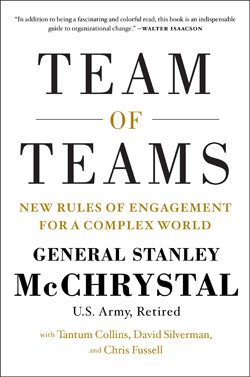Who would have thought that Al Qaeda in Iraq (AQI) would change the rule book on effective management systems?
In his book, “Team of Teams: New Rules of Engagement for a Complex World,” four-star General Stanley McChrystal describes how, in order to defeat AQI, he had to create a task force that was faster, flatter and more flexible than the traditional military model based on the scientific model of efficiency.
 The book is a fascinating account of military strategies both failed and successful. Most importantly, the general brings us into the 21st Century by explaining how technology and complex communication systems require transformational thinking, the break-up of departmentalized silos and the creation of smaller systems (teams) that are interconnected and bonded by shared learning.
The book is a fascinating account of military strategies both failed and successful. Most importantly, the general brings us into the 21st Century by explaining how technology and complex communication systems require transformational thinking, the break-up of departmentalized silos and the creation of smaller systems (teams) that are interconnected and bonded by shared learning.
Complexity versus complicated
The reader learns that the new realities in terrorism are lessons in complexity and require a different approach from complicated problems. These two words are important to understand and McChrystal devotes a chapter to them to explain that ‘complicated’ has an end solution while ‘complexity’ is a constant state of chaos and change.
“To confront a constantly shifting threat in a complex setting we would have to pursue adaptability,” McChrystal writes. “Our foe, AQI, appeared to achieve this adaptability by way of their networked structure which could organically reconfigure with surprising agility and resilience. We realized that in order to prevail, our task force would need to become a true network”
While complicated problems are difficult, they can be resolved in the command and control approach, or independently. Complexity, on the other hand, requires both the talents and expertise of many who are interconnected to work as one team of problem solvers. Furthermore, teams of teams are required to manage large, complex problems such as, natural disasters, terrorist attacks, violence or pestilence etc. The team of teams strategy “has worked everywhere from hospital emergency rooms to NASA. It has the potential to transform organizations large and small.”
To build resilient teams and networks of teams, the reader is taken to Coronado, California. Here, aspiring Navy SEALs undertake a grueling six-month three-phase program called Basic Underwater Demolition/SEAL training (BUD/S). It is estimated that out of 160 students, more than half will drop out.
Navy SEALS epitomize Team of Teams. They become team players to survive in the frigid Pacific waters and the rigorous training. Their actions become synchronized with shared memories and training. Yet, they remain individuals and work together with precision – as is described in amazing detail when three Navy SEALs rescue a sea captain held by pirates off the Somali Coast.
Team of Teams is a reality check on present managerial complexities. McChrystal and his co-authors understand the modern high-tech threats that challenge organizations. Most importantly, the authors show that organizations everywhere can benefit by adapting to change by becoming more flexible, less commanding and releasing decision making to teams of teams. They blend the present with the past to show how tradition and mindsets in old management systems and operating models are inadequate in a chaotic new world. The book is a good read and a keeper.
We are reminded that “…transformation is reflective of the new generation of mental models we must adapt in order to make sense of the 21st Century. If we do manage to embrace this change, we can unlock tremendous potential for human progress.”
Lucia Worthington teaches business and management at Clark College. In one of her “former lives” she taught business and management for the University of Maryland at over 25 U.S. military bases in Asia, Europe and the Middle East. She can be reached at: success@lworthington.com. To recommend a book for review, email bookreviews@vbjusa.com.


